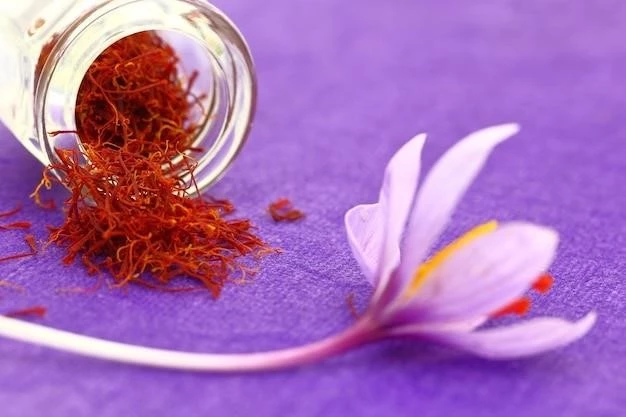Saffron⁚ Health Benefits and Uses
The medicinal properties of saffron have been utilized for centuries to treat various health conditions.
Overview of Saffron’s Medicinal Properties
Saffron has a rich history of use in traditional medicine for treating various health conditions, including fever, bronchitis, and colds. Its medicinal properties have been valued for centuries, making it a popular choice for promoting overall well-being.
Historical Uses of Saffron in Treating Various Health Conditions
Folkloric uses of saffron historically included its application as a sedative, expectorant, aphrodisiac, and diaphoretic. The paste of sandalwood and saffron was used to soothe dry skin. Saffron has been valued throughout history for its diverse health benefits and medicinal properties.
Saffron⁚ Side Effects and Precautions
The side effects of saffron consumption are minimal, with no significant adverse effects reported in standard cooking amounts. Nevertheless, it’s essential to be cautious and use saffron supplements under proper guidance to ensure safety and efficacy.
Potential Risks and Side Effects of Saffron Consumption
Some studies suggest that saffron may trigger mood swings in individuals with specific conditions. While using saffron supplements in the short term appears safe for most people, it’s crucial to be aware of these potential risks, particularly if you have underlying mood disorders.
Precautions to Consider When Using Saffron
While saffron is generally safe and well-tolerated, it’s important to exercise caution, especially when using supplements. Individuals with mood disorders should be particularly mindful of potential mood swings that may be triggered by saffron consumption.
Saffron for Skin Conditions
Saffron application has a long history of promoting healthy skin by enhancing complexion, reducing pigmentation, and imparting a natural glow. However, caution must be exercised to avoid potential side effects, especially with excessive use.
Benefits of Saffron for Skin Health
Saffron has been utilized for its skin-enhancing properties, such as improving complexion, reducing pigmentation, and giving a natural radiance to the skin. However, caution is advised due to potential side effects, especially with improper use.
Potential Side Effects of Applying Saffron on the Skin
While saffron is known for its skin benefits, excessive use can lead to potential side effects such as allergic reactions, including hives, nasal congestion, and breathing difficulties. It is essential to be cautious and perform a patch test before widespread application.

Saffron Extract⁚ Information and Dosage
Studies indicate that saffron extract shows promise in promoting mental health and may have significant benefits when taken at appropriate dosages.
Effectiveness and Safety of Saffron Extract
Research indicates that saffron extract can be effective in promoting mental health by potentially enhancing neurotransmitter levels. When used at appropriate dosages, saffron extract shows promise in delivering its health benefits safely.
Recommended Dosages of Saffron Extract for Various Health Conditions
Studies suggest that doses of 20 to 400 mg/day of saffron or up to 1.5 g/day are generally safe and effective for harnessing the potential health benefits of saffron extract. However, caution must be exercised to avoid excessive dosages that may lead to adverse effects
Saffron and Cardiovascular Health
Saffron constituents display potential in promoting a healthy cardiovascular system, with its compounds demonstrating positive effects on metabolic and atherosclerotic risk factors.
Role of Saffron in Promoting Cardiovascular Health
Research suggests that saffron compounds hold the potential to positively impact metabolic and atherosclerotic risk factors, thus contributing to cardiovascular health. These findings highlight saffron’s promising role in promoting a healthy cardiovascular system.
Impact of Saffron on Cardiovascular Risk Factors
Studies indicate that saffron compounds have shown potential in positively influencing metabolic and atherosclerotic risk factors, emphasizing the herb’s role in promoting cardiovascular health by targeting specific risk factors that affect heart health.
Potential Drug Interactions of Saffron
Saffron may interact with blood thinners, potentially enhancing their effects and increasing the risk of bleeding. Caution is advisable when using saffron with such medications to prevent adverse reactions.
Interactions Between Saffron and Blood Thinners
Saffron may interact with blood thinners, heightening their effects and potentially increasing the risk of bleeding. Special caution should be taken when combining saffron with these medications to minimize adverse reactions.
Cautionary Notes on Using Saffron with Certain Medications
When using saffron with certain medications, caution is advised, as it may interact with blood thinners, potentially leading to increased bleeding risk. Individuals should consult healthcare providers before combining saffron with these medications to prevent adverse effects.
